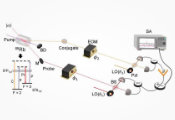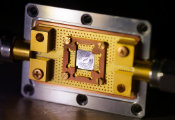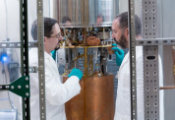Rigetti Computing Reports Third Quarter 2024 Financial Results and Business Updates
BERKELEY, Calif., November 12, 2024 -- Rigetti Computing, Inc. (“Rigetti” or the “Company”), a pioneer in full-stack quantum-classical computing, today announced its financial results for the third quarter ended September 30, 2024 and business updates, including updates to its technology roadmap.
Third Quarter 2024 Financial Highlights
- Total revenues for the three months ended September 30, 2024 were $2.4 million
- Total operating expenses for the three months ended September 30, 2024 were $18.6 million
- Operating loss for the three months ended September 30, 2024 was $17.3 million
- Net loss for the three months ended September 30, 2024 was $14.8 million
- As of September 30, 2024 cash, cash equivalents and available-for-sale securities totaled $92.6 million
Technology Updates
Roadmap update
The Company plans to introduce a new modular system architecture in 2025. By mid-year 2025, the Company expects to release a 36-qubit system based on four 9-qubit chips tiled together with a targeted 99.5% median 2-qubit fidelity. By the end of 2025, the Company expects to release a system with over 100 qubits with a targeted 99.5% median 2-qubit fidelity. Rigetti plans to develop the 336-qubit Lyra™ system thereafter.
Rigetti remains on track to develop and deploy its anticipated 84-qubit Ankaa™-3 system with the goal of achieving a 99+% median 2-qubit gate fidelity by the end of 2024.
We believe superconducting qubits have many advantages, including that they are fabricated using well-established semiconductor design and manufacturing techniques. Superconducting qubits also perform faster gate operations than other qubit modalities. Rigetti’s system gate speeds consistently achieve an active duration of 60-80ns, which is four orders of magnitude faster than other modalities such as ion traps and pure atoms. System speed is an important factor to enable hybrid computing with current CPUs/GPUs.
“After spending years optimizing the performance of our larger scale 84-qubit Ankaa™ chips and honing our multi-chip scaling technology, we are manufacturing 9-qubit chips at 99.4% 2-qubit median fidelity, and in Q3 of this year we demonstrated tiling of 9-qubit chips without deterioration in performance,” says Dr. Subodh Kulkarni, Rigetti CEO. “We believe the anticipated 4-chip 36-qubit system will be the most ambitious multi-chip QPU architecture in the market, and a significant milestone for the company and the quantum computing industry. Our approach to scalability, mirroring multi-chip architectures for advanced applications with CMOS, is supported by our recently announced Alternating-Bias Assisted Annealing (ABAA) technique for precisely targeted qubit frequencies. ABAA allows us to consistently manufacture high performance QPUs with the frequency precision necessary for high fidelities. The combination of our ABAA technique and a multi-chip architecture is the cornerstone of our scaling strategy as we move into developing higher qubit count systems.”
Demonstrating real-time and low-latency QEC with superconducting qubits
Quantum error correction (QEC) will be essential to achieve the accuracy needed for quantum computers to realize their full potential. Together with Riverlane, Rigetti is working to advance our understanding of how to build fault tolerant quantum computers using QEC technology.
Rigetti’s recent paper with Riverlane, “Demonstrating real-time and low-latency quantum error correction with superconducting qubits,” demonstrates how integrating Riverlane’s quantum error decoder into the control system of Rigetti’s 84-qubit Ankaa-2 system enabled the achievement of real-time, low-latency quantum error correction, a critical process for developing fault tolerant quantum computers.
Novera QPU co-located at Israeli Quantum Computing Center
Rigetti believes that its 9-qubit Novera™ QPU is ideal for experimentation across a variety of research areas including qubit characterization and hybrid quantum algorithms. Rigetti is excited to share that a Novera QPU has been co-located at the Israeli Quantum Computing Center (IQCC) with Quantum Machines’ OPX1000 control system and NVIDIA’s Grace-Hopper superchip servers, which was made available to partners for research and experimentation. The set-up was recently leveraged for a reinforcement learning project, which was presented at IEEE Quantum Week 2024 in September. The demonstration entailed optimizing single qubit operations on the Novera QPU, and is an exciting use case for using a Novera QPU for quantum machine learning development.
Novel chip fabrication process for scalable, high performing QPUs
We believe quantum computers capable of addressing real-world problems will require hundreds to thousands of high performing qubits. Because qubits are sensitive to noise and other external factors, an important factor for scaling to higher qubit count systems is improving control over the materials, design, and environment of qubits. In August 2024, Rigetti introduced a novel chip fabrication technique, ABAA, that allows for qubit frequencies to be precisely targeted prior to a chip being packaged. The technique entails applying a series of low, alternating voltages at room temperature to the junctions that form the qubit. Unlike more complicated solutions that address the problem of tuning frequency, which often require laser trimming of the chip, ABAA is a simple and scalable process.
The Company found that leveraging ABAA enables improved execution of 2-qubit gates and a reduction in defects, which both contribute to higher fidelity.
The Company is leveraging the ABAA technique to fabricate chips for the Novera QPU and the upcoming Ankaa-3 system.
Business Updates
NQCC opens landmark facility that includes fully operational Rigetti QPU
The National Quantum Computing Centre (NQCC) officially opened the doors of its landmark facility on Harwell Campus on October 25, 2024.
The facility will support world-class quantum computing research and provide state-of-the-art laboratories for designing, building and testing quantum computers. The state-of-the-art facility includes a fully operational 24-qubit Ankaa-class system that will be made available to NQCC researchers for testing, benchmarking, and exploratory applications development.




































